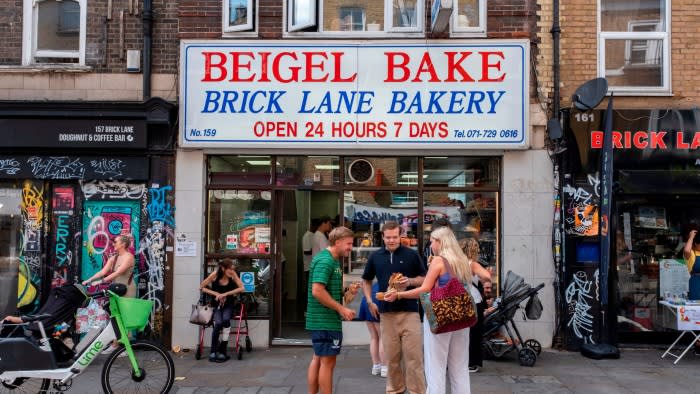Unlock the Editor’s Digest for free
Roula Khalaf, Editor of the FT, selects her favourite stories in this weekly newsletter.
Daniel Cohen is conflicted about managing the remaining beigel shop on Brick Lane in east London. For 50 years, his family’s Beigel Bake, which touts itself as “London’s most famous 24/7 bakery” — and is known as the “white one”, a reference to the colour of its sign — has had an amicable rivalry with its neighbour, self-described “Britain’s first and best beigel shop” — or the “yellow one” to everyone else. Together, they were a London landmark.
In February, Cohen’s neighbour, the Beigel Shop, closed, a possession notice sellotaped to its windows, only to be covered by another, blaming electrical issues. The ravens left the tower.
Beigels came to Brick Lane in the 19th century as Jews arrived in the area, escaping hardship and pogroms of eastern Europe. Another wave of immigrants — Bengali Muslims — arrived after the second world war, opening restaurants and making the area a destination for curry.
Maria Balinska, author of The Bagel: The Surprising History of a Modest Bread, says that over the years, as the bagel’s popularity has spread, it has become synonymous with New York. “Having said that, given the centuries of rhymes, stories, songs and sermons about bagels, they do retain their cultural connotations for the Jewish community.” The “Brick Lane bagels are closer to the [smaller] size they were in eastern Europe”, she observes. As are those from Rinkoffs bakeries in Whitechapel, started in 1911 by a migrant from Kyiv. Balinska uses the western spelling, bagel, while Cohen insists on beigel.
Since 1870, Paul Gardner’s family have supplied paper bags to businesses in the area, including to both Brick Lane beigel shops. He says: “It was pretty hard for a lot of people around there. It’s still hard for people around there. You’ve got the gentrified area, then you’ve got like the old days where people are so poor. I suppose the city slowly moves on. I preferred the old days because they were just a bit madder.” Rising rents are a pressure. Gardner describes it as “the East End with West End prices”. His old bag store on nearby Commercial Street now sells Chablis and Burgundy. “You didn’t get too many wine shops when I was there.”
For Cohen, his rival’s closure means he has a bigger slice of the bakery pie. “People think we’re superior.” Is that boastful? “It’s what people say,” he says. But he is sad too. “We don’t want some stranger to come to the road.” He also suspects their presence helped to pull in the crowds — a cluster effect like Hatton Garden, London’s jewellery quarter.
In any case, Cohen anticipates the yellow one will return. A local hotel is in discussions to host it as a pop-up. The Beigel Shop did not respond to requests for comments, though its Instagram account says it will reopen.
Queues have long been a feature of the beigel shops. Whenever I visited, the white one’s tended to outstrip its neighbour’s. Though people argue over the merits of the rivals, I would typically end up in the shorter queue. Earlier this year, a couple visiting London asked me if the yellow one really was OK because they’d seen an Instagram post claiming the white one was the best beigel in town. “We get lots of influencers,” says Cohen. “They’re a huge help.”
Foodie virality is unpredictable. Some venues can’t cope with their sudden popularity and consequently have banned influencers. I’m baffled by the two-hour queues outside a trailer serving baked potatoes in Tamworth, dished out by Spudman, who sports a pink mohawk and has more than 3mn TikTok followers.
Sales at Beigel Bake are almost back to pre-pandemic levels, Cohen says. Night-time trade at the 24-hour bakery is slow, however. “People have been put off socialising.” Food inflation has hurt too. “Beef went up hugely, eggs went up. Cream cheese tripled, a lot of dairy went up massively.”
I ask if antisemitism following the Israel-Hamas conflict has had an impact. Cohen says it hasn’t. About 50 per cent of his workforce (40 mostly part-time workers) is Muslim. “They’re like my brothers.”
This is a family business. Cohen works with his brother and uncle. “I worked alongside my father for years, [he] became my best friend. If my kids want to take over, I’d like them to but I want them to be happy.”


